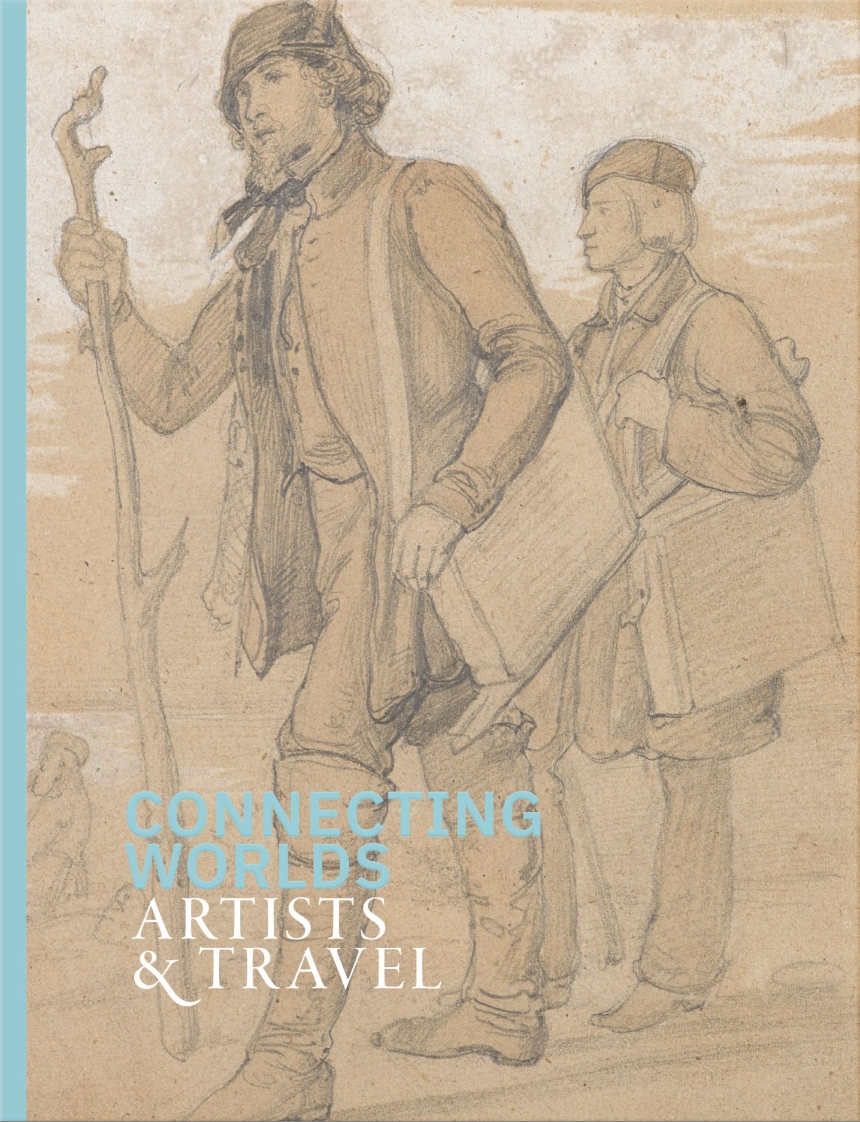This book explores the concept of travel as inspiration for artists across history.
Comprising over one hundred such works, Connecting Worlds: Artists & Travel is the first exhibition dedicated to artists’ experiences of travel from the Renaissance to the nineteenth century. A collaboration between the Kupferstich-Kabinett, Staatliche Kunstsammlungen Dresden, and the Katrin Bellinger Collection, London, the exhibition includes works by major artists, lesser-known professionals, as well as amateurs, mostly from Northern Europe. Divided into three sections, the exhibition begins by exploring the work of artists on the road and what they regarded as important to record in their sketchbooks. The second section looks at Rome as one of the most important destinations for Northern travelers, and the journey ends in Dresden, a center of cultural exchange and glamorous festivities.
This richly illustrated catalog features essays by an international panel of experts addressing such topics as the uses of artist sketchbooks across time, written and visual accounts of travel in books and prints, and encounters with the Ottoman world.
Comprising over one hundred such works, Connecting Worlds: Artists & Travel is the first exhibition dedicated to artists’ experiences of travel from the Renaissance to the nineteenth century. A collaboration between the Kupferstich-Kabinett, Staatliche Kunstsammlungen Dresden, and the Katrin Bellinger Collection, London, the exhibition includes works by major artists, lesser-known professionals, as well as amateurs, mostly from Northern Europe. Divided into three sections, the exhibition begins by exploring the work of artists on the road and what they regarded as important to record in their sketchbooks. The second section looks at Rome as one of the most important destinations for Northern travelers, and the journey ends in Dresden, a center of cultural exchange and glamorous festivities.
This richly illustrated catalog features essays by an international panel of experts addressing such topics as the uses of artist sketchbooks across time, written and visual accounts of travel in books and prints, and encounters with the Ottoman world.
Table of Contents
Artists and travel have for centuries been intertwined where the desire to explore
beyond the confines of one’s home has provoked a truly astonishing outpouring of
creativity, much of which was captured through drawings and prints. Comprising
over 100 such works, Connecting Worlds: Artists & Travel will be the first exhibition
to approach the subject through the lens of artists’ experiences of travel from the
Renaissance to the nineteenth century, before the establishment of the railroad
and use of photography as a means of recording changed these experiences deeply.
A collaboration between the Kupferstich-Kabinett, Staatliche Kunstsammlungen
Dresden, and the Katrin Bellinger Collection, London, the exhibition will include
works by major artists, lesser known professionals as well as amateurs, mostly from
Northern Europe, amongst them Albrecht Du¨rer, Hans Holbein the Younger, Pieter
Bruegel the Elder, Wenceslaus Hollar, Zacharias Wagner, Valentin Klotz, Maria Sibylla
Merian, Angelika Kauffmann, Franz Pforr, Augusta von Buttlar, Julie von Egloffstein,
Ludwig Richter, and Friedrich Preller the Elder.
Divided into three sections, “On the road”, “Destination Rome”, and “Dresden”,
the exhibition begins by exploring artists on the road and what they regarded as
important to record in sketchbooks and individual sheets. The second section
looks at Rome as one of the most important destinations for Northern travellers,
with its incomparable remains of antiquity and as the seat of the Catholic Church
that celebrated its religious and administrative life through processions and public
spectacle.
The journey ends in Dresden, as a centre for collecting, cultural exchange
and glamorous festivities, ambitiously competing with other international courts
since the time of Augustus the Strong. A different kind of travel, made possible by
collecting images and stories of landscapes, flora, fauna, and cultures previously
unknown in Europe, is explored. This section closes with the story of the Indonesian
Romantic artist Raden Saleh, who first visited Dresden in 1839, and was warmly
welcomed by the Saxon court.
The richly illustrated catalogue will feature essays by an international panel of
experts addressing such topics as the uses of artist sketchbooks across time, written
and visual accounts of travel in books and prints, encounters with the Ottoman
world, travel and collecting at the Saxon court.
beyond the confines of one’s home has provoked a truly astonishing outpouring of
creativity, much of which was captured through drawings and prints. Comprising
over 100 such works, Connecting Worlds: Artists & Travel will be the first exhibition
to approach the subject through the lens of artists’ experiences of travel from the
Renaissance to the nineteenth century, before the establishment of the railroad
and use of photography as a means of recording changed these experiences deeply.
A collaboration between the Kupferstich-Kabinett, Staatliche Kunstsammlungen
Dresden, and the Katrin Bellinger Collection, London, the exhibition will include
works by major artists, lesser known professionals as well as amateurs, mostly from
Northern Europe, amongst them Albrecht Du¨rer, Hans Holbein the Younger, Pieter
Bruegel the Elder, Wenceslaus Hollar, Zacharias Wagner, Valentin Klotz, Maria Sibylla
Merian, Angelika Kauffmann, Franz Pforr, Augusta von Buttlar, Julie von Egloffstein,
Ludwig Richter, and Friedrich Preller the Elder.
Divided into three sections, “On the road”, “Destination Rome”, and “Dresden”,
the exhibition begins by exploring artists on the road and what they regarded as
important to record in sketchbooks and individual sheets. The second section
looks at Rome as one of the most important destinations for Northern travellers,
with its incomparable remains of antiquity and as the seat of the Catholic Church
that celebrated its religious and administrative life through processions and public
spectacle.
The journey ends in Dresden, as a centre for collecting, cultural exchange
and glamorous festivities, ambitiously competing with other international courts
since the time of Augustus the Strong. A different kind of travel, made possible by
collecting images and stories of landscapes, flora, fauna, and cultures previously
unknown in Europe, is explored. This section closes with the story of the Indonesian
Romantic artist Raden Saleh, who first visited Dresden in 1839, and was warmly
welcomed by the Saxon court.
The richly illustrated catalogue will feature essays by an international panel of
experts addressing such topics as the uses of artist sketchbooks across time, written
and visual accounts of travel in books and prints, encounters with the Ottoman
world, travel and collecting at the Saxon court.

